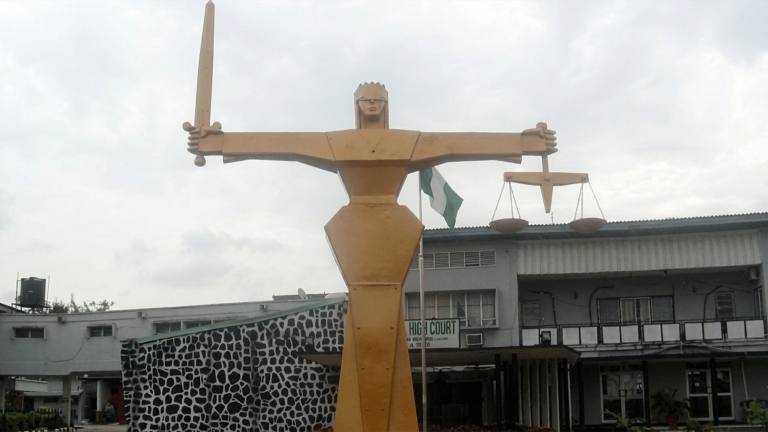
Following the outbreak of COVID-19 in Nigeria early this year, governors of the 19 northern states banned the ‘Almajirai from the streets and embarked on the repatriation of thousands of ‘Almajiri’ from the streets back to their state of origins.
However, few months after the ban and repatriation, the Almajirai are back to the street.
In Kaduna, our correspondent reports that few Almajirai were seen moving around the metropolis in search of food.
The Almajirai who are mostly children between ages 5-10 usually visit business centres and offices to beg.
Although, their number is not as much as they were before the ban which means they are also being very careful as they move around.
Also, these children now approach people to beg for alms without their usual bowls, apparently to avoid attracting the attention of the authorities.
Checks showed that most of the major almajirai schools in communities like Tudun Wada, Askolaye , Hayin Malam Bello New Extension, Kawo and others within the metropolis were empty with only a few adults still around.
10-year-old Musa Tanko said that his teacher brought him back two months ago. According to him, they lived in Rigasa community of Igabi Local Government Area of the state.
“We were sent back home when the government said all almajirai should return to their villages. We just came back two months ago. Only few of us were brought back though,” he said.
Another teenage almajiri who simply identified himself as Sanusi said they have been in the state despite the ban.
He said only the minors among them were evacuated back to their home states by their clerics.
“As for us, we have been in the state but we are not begging. I usually travel home occasionally to see my parents too.
Similarly, another 10-year-old boy, Shafi’u Musa said his parents returned him to Kaduna.
“We are from Igabi Local Government Area but my parents sent me back to continue with my knowledge in the city. But we are not much in my school that returned,” he said
‘We are Aware’
The Commissioner of Human Development and Social Services, Hajiya Hafsat Baba confirmed that her ministry was aware that some of the children were returning to the streets.
She blamed some of the Malams whom she said were secretly returning the children from the rural areas to continue as beggars.
“We are aware that some of them have started returning to the city; in fact, as we speak, we have arrested 18 of them and they will be evacuated to Soba Local Government Area of the state where they came from.
“We blame their Malams because they depend on these children to go and get money for them through begging, that is why they are secretly bringing them back.
“Also, some of the parents of these children too should be blamed because they still send their children to those scholars as Almajirai”, she said.
The commissioner further added that henceforth, the ministry has resolved that anybody arrested returning these children to the state will be punished, adding that the law banning the system was still enforced across the state.
Bauchi
In Bauchi, hundreds of Almajirai could be seen roaming the streets begging for alms and food across towns and cities in Bauchi State.
Our correspondent, who monitored the situation, observed there has been an increase in the number of the Almajirai in various markets, motor parks and the roadside.
A large number of Almajirai could be seen clutching their plates around the Abubakar Tafawa Balewa Stadium, Wunti Roundabout and other locations in Bauchi metropolis.
12-year-old Almajiri, Salim Mohammed said that he was repatriated to his village in Soro Ganjuwa LGA during the last Ramadan alongside hundreds of his colleagues but was brought back by his elder brother.
“I am in the Markaz of Shehi along the Bauchi-Gombe road and during the Ramadan, our Malam, Malam Yusufa return us back to our parents’ houses and after sometimes, we returned back to the school. It was my father who instructed my senior brother to return me to Bauchi,” he said.
Isiaka Ahmadu, 13-year-old almajiri, said, his parents brought him back from Yobe to Bauchi some months back to continue his Qur’anic education at Malam Shuaibu Islamiyya school in Sabon Layi area of Bauchi.
“I was not part of repatriated Almajirai because during the period, I was at home helping my father to clear his farmland in preparation for the rainy season and after we finished planting the crops, my father took me back to Bauchi”, he said.
Ahmadu explained that there were many students who returned to the school after they were repatriated and continued with their routine exercise at the school.
The influx of children in Bauchi our correspondent learnt might not be unconnected with the position of proprietors of Tsangaya Schools under the leadership of a renowned Islamic Scholar, Sheikh Dahiru Usman Bauchi, who had opposed the ban of the Almajiri system by northern governors.
He described the move as a “callous, discriminatory and a conspiracy against Qur’anic knowledge.”
Sheikh Dahiru Bauchi said children have rights to choose to live anywhere they want to live.
“We are Nigerians; we have rights under the laws of the land to live where ever we want to live and to practice our religion. Qur’anic Pupils and their teachers have these rights and henceforth, we will not accept violations of our rights in the name of banning Almajiranci and evacuation of our pupils from place to another like stray animals, we will not accept it and we disagree with any law that will contravene our rights,” he said.
Ban still in force
Meanwhile, the Bauchi State government has reiterated its position on the ban of Almajiris roaming the street, saying that the government was only against child begging and not acquisition of Qur’anic knowledge.
Governor Bala Mohammed stated this recently during the graduation ceremony held at the Sheikh Dahiru Bauchi Qur’anic schools at Abubakar Tafawa Balewa Stadium, Bauchi.
Represented by the State’s Commissioner for Education, Dr Aliyu Usman Tilde, the governor cleared the air about government aversion to child begging in the name of Almajirci, saying he was not against the Qur’an but an effort to avert child abuse.
“Our goal is to eradicate begging and give every child the right to grow with his parents or under a caring custodian, as the Sheikh is doing to his children and others in his schools; helping them to gain both Qur’anic and Western education.
“This, we believe, will make them more useful citizens of the country, possessing both left and right hands, as the Sheikh once put 30 years ago,” he said.
Kano
In Kano, our correspondent reports that the almajirais were still seen in their numbers across many parts of the state despite the ban by the government.
They could be seen moving around the city begging for alms and doing menial work for a living.
Although, the number of almajirai currently on the streets has reduced compared to what used to be the case in the past.
An Almajiri who roams the street of Gandun Albasa around Zoo Road in Kano, Kamalu Tsalha said he was not aware of the ban on street begging in the state.
“I don’t know that government has banned begging or is arresting beggars. I don’t carry a bowl to beg as you can see and I’m only out today because today (Friday) is school-free day.
We only roam on Thursdays and Fridays, and work for people to be paid; I personally hardly beg for food,” he said.
Another almajiri who identified himself as Sabo said many of his colleagues have already been evacuated to their states of origin by their parents.
“Some have been deported by the state government since the outbreak of COVID-19, while some were evacuated by their parents. In fact, the few of us left here don’t beg as we used to do,” Sabo said.
The Kano State government this year banned street begging by the Almajirai children and vowed to integrate the indigene Almajirai children into special schools while non indigenes were repatriated to their respective states of origin.
Available statistics showed that no fewer than 1,500 Almajiri’s were repatriated to their states of origin from Kano while the state has received 1,178.
The State’s Commissioner for Education, Muhammad Sunusi Kiru said government was in a final push to move Almajiri children from the streets to put an end to street begging in the state.
“Those from Kano State, we have provided enough facilities to accommodate them for their Qur’anic studies and formal education.
“We are going to enroll all of them from Kano origin while those from other states will be taken to their states,” he said.
He said the state government has approved the sum of N159 million for the rehabilitations of three Almajiri boarding schools where the children who are from the state will be housed.
Kiru said the schools are located in Kanwa, Madobi LGA; Bunkure in Bunkure LGA and Kiyawa in Bagwai Local Government Area.
He said the three new schools will bring to 15, the total number of Almajiri integrated schools in the state.
Kastina
On Thursday, June 11, 2020, Katsina State government banned street begging across the state just as Islamiyya and Almajiri schools were asked to remain closed.
The secretary to the State Government, Dr Mustapha Inuwa in a statement said the decisions were reached after a review in a meeting involving the government, security chiefs, Islamic religious leaders, Ulamas, members of the State COVID-19 Emergency and Response Committee and other stakeholders, held at General Muhammadu Buhari House.
He said, anybody found begging in the street will be arrested and his tutor or parents will face full wrath of the law.
While the order for the closure of the schools was still in force, the governor had directed security agents to arrest and bring to book, defaulters.
However the Almajirais have returned to the streets and their routine activities of begging fully resumed.
Our correspondent learnt that there was a committee set up by the state government through the office of the Secretary to the State Government, to look into the matter.
When contacted, the chairman of the committee, who is also the Special Assistant to Governor Masari on Employment, Hussaini Adamu Karaduwa, said the committee was through with its findings on the matter and had submitted to the office of the SSG.
Plateau
In Plateau State, there seems to be a resurgence of Almajiri on the streets of Jos, the state capital even though they are not as many as they were before they were evacuated in April this year.
On April 11, the state government through the Secretary to the Government of the State, Danladi Atu, announced the commencement of evacuation of the Almajiri pupils from the 17 LGAs to their states of origin.
Our correspondent who visited Parargada Market, Bauchi Road, and Terminus, on Thursday, reports that a few of the Almajiris could be seen roaming around.
Usman Ibrahim, an Almajiri said he had not gone anywhere even when some of his mates were returned home.
“Since the ban on street begging, I have not been out to as far as Terminus area for fear of being arrested,” he said (Daily Trust)








445988 970788I enjoyed reading your pleasant site. I see you offer priceless info. stumbled into this site by chance but Im certain glad I clicked on that link. You surely answered all the questions Ive been dying to answer for some time now. Will definitely come back for much more of this. 129744
669246 956091Wohh just what I was seeking for, thanks for putting up. 569512